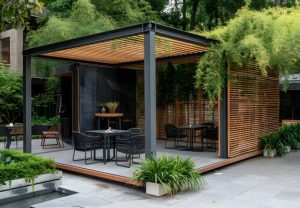While brainstorming ideas for your latest landscaping project in Perth, you have probably spent a lot of time thinking about the layout of your space and dreaming of the design features you would like to include. However, you probably haven’t given much thought to which type of mulch to apply and it’s benefits. Although mulch isn’t known to be the prettiest member of the landscape materials family, it plays a key role in soil health and subsequently plant health.
A broad definition of mulch is a layer of organic material applied to the soils surface. Mulch has a long list of benefits, some of which include:
- Increased water conservation, by reducing moisture loss from the surface of the soil
- weed suppression, by preventing the spread and germination of weed seeds
- it acts as an insulator, helping to maintain a stable soil temperature
- it can add additional nutrients to the soil and improve soil structure as it breaks down
- it can be used to enhance the aesthetics of a space.
Typically mulch can be broken down into three main categories, including straw based mulches, wood and bark based mulches and stone based mulches.
Straw Based Mulches
Straw, pea straw, lucerne and lupin mulches are four popular types of straw based mulches, used by Perth Landscapers. These are most beneficial when applied to edible and ornamental plant growing situations, including vegetables, fruit trees and flowering plants, a common feature in many residential landscaping projects in Perth. Straw mulches rapidly break down, adding beneficial nutrients to the soil, which is especially useful when growing vegetables. Straw is generally the most affordable of the four and if you are vigilant with your soil improvements, the added nitrogen that pea straw and lucerne contain, aren’t going to make a huge difference to your soils health. While the rapid breakdown of straw mulches means that beneficial nutrients are reaching plants faster, it also results in the need for more frequent mulch top ups, so being a keen gardener, (which edible and ornamental plant growers generally are) does help!
[/spb_text_block] [spb_image element_name=”Smart Line” image=”7354″ image_size=”full” frame=”noframe” caption_pos=”hover” remove_rounded=”yes” fullwidth=”no” overflow_mode=”none” link_target=”_self” lightbox=”no”
Wood and Bark Based Mulches
Wood and bark based mulches are the most prevalent mulch types used in Perth landscaping. When looking for a suitable wood or bark based mulch for your garden, be sure to opt for a medium to coarse grade mulch, which won’t absorb water, but rather enable it to reach the plants root zone where it is most needed. These types of mulches also tend to take longer to break down and are therefore a better medium term solution, in contrast to straw based mulches. Nitrogen drawdown is one issue that can occur with wood and bark based mulches. This is where microbes consume the majority of the available nitrogen in the soil, which in turn isn’t available to the plants. However, this is only one stage in the cycle which will pass. If you are concerned about this, blood and bone can be applied to the soil below the mulch, which provides an additional food source for the microbes, limiting any potential stress on plants.
Stone Based Mulches
Stone based mulches also known as inorganic mulches, don’t break down and therefore don’t have the added nutrient benefits of their straw, wood and bark based counterparts. Stone based mulches include materials such as river stones, gravels and scoria’s. These come in a wide range of sizes, textures and colours and can be a great addition for area’s where you are wanting to make a statement. They are especially applicable with the growing succulent and cacti landscaping trend in Perth. However, when considering a stone based mulch for your landscaping project, keep ongoing maintenance requirements in mind, as it can be difficult to pick up leaves and other debris from these types of surfaces.
As is with most things in life, looks can be deceiving with mulch as well. When carrying out landscaping in Perth environments, keep an eye out for mulch mixes on the market that contain peat, which is mined from fragile wetland areas. This wrecks havoc on these delicate ecosystems and is entirely unnecessary, when there are so many great alternatives available. Some mulch manufacturers will even go as far as dying their mulch a darker colour, to make it look more appealing and in some instances, they will use petrochemical based products to do the job! So if you care about the environment and unless your plants happen to have an acquired taste for diesel, stay well away from the above. Whatever mulch type you decide on, alway’s ensure you are purchasing this from an accredited supplier, that adheres to Australian Standards. Personally we LOVE the Green Life Soil Co products. They prepare some fantastic mulch mixes and can give you expert advice, on the best type of mulch and application for your property.
Need Us To Help With Your Garden?









